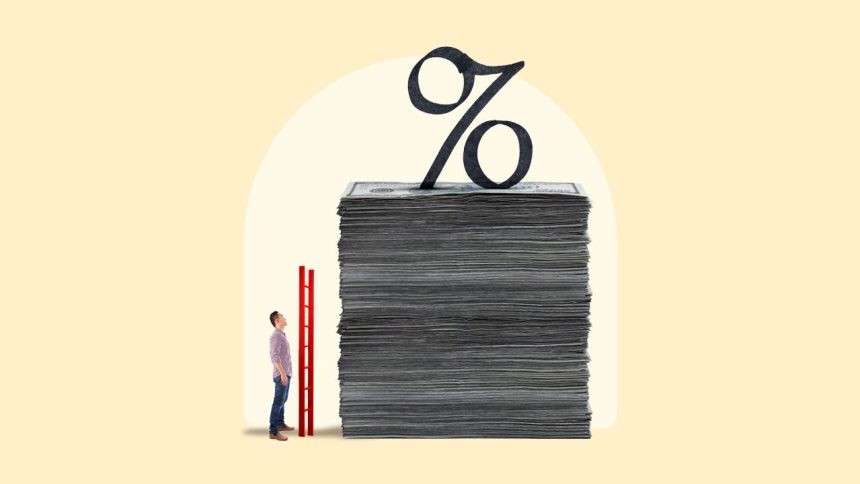Investors have been on quite a ride the past few years. Consistent contributors to retirement plans, such as a 401(k), have been largely rewarded by staying the course through the ups and downs in the markets during the bear market of 2022 and interest rate hikes by the Federal Reserve.
Average 401(k) plan balances reached $134,128 in 2023, up from $112,572 in 2022 and down from $141,542 in 2021, according to Vanguard’s “How America Saves 2024” report.
While short-term market volatility is inevitable, it’s important not to overreact to large swings in price. Remember to stay focused on your long-term investment plan and keep building up that retirement nest egg.
Average and median 401(k) balance by age
These are the average and median balances for specific age groups at the end of 2023, according to Vanguard, which gathered data from about 5 million defined contribution plan participants across its recordkeeping business.
| Age | Average Account Balance | Median Account Balance |
|---|---|---|
| Source: Vanguard, “How America Saves 2024” | ||
| Under 25 | $7,351 | $2,816 |
| 25-34 | $37,557 | $14,933 |
| 35-44 | $91,281 | $35,537 |
| 45-54 | $168,646 | $60,763 |
| 55-64 | $244,750 | $87,571 |
| 65+ | $272,588 | $88,488 |
Age 25 and younger
- Average 401(k) balance: $7,351
- Median 401(k) balance: $2,816
The median balance for people just getting started in their careers is $2,816 . That means half of 401(k) plan participants in this age group have less than that amount saved and half have more. The average balance is quite a bit higher, skewed by those who are able to save more in their 401(k).
How much should you strive to save for retirement? Fidelity, which manages employee benefits programs for nearly 28,000 businesses and offers a variety of financial planning services, suggests saving at least 10 times your annual salary by age 67.
The firm also advocates following another metric: Save 15 percent of your pretax income from the time you begin your career – including any company match. So, if your employer matches 3 percent of your salary, you’d need to save 12 percent. If current expenses preclude this possibility, work toward that amount as a goal.
Ages 25-34
- Average 401(k) balance: $37,557
- Median 401(k) balance: $14,933
Again, the average 401(k) balance is more than twice the median balance, reflecting the larger savings capacity of high-wage earners and those resolved to maximizing their 401(k) plan.
By age 30, Fidelity recommends having the equivalent of one year’s salary stashed in your workplace retirement plan. So, if you make $50,000, your 401(k) balance should be $50,000 by the time you hit 30.
If you’re running behind, try increasing your contribution amount by a couple of percentage points when you can during your 30s. This is especially easy if you time the increase with any raises or bonuses you get. This way you don’t feel any pinch in disposable income. In fact, it will help keep your spending in check if you live beneath, rather than above, your means.
Ages 35-44
- Average 401(k) balance: $91,281
- Median 401(k) balance: $35,537
In your 40s, you have lots of financial obligations – typically a mortgage payment, and perhaps a family with all its related costs. Still, it’s important to defer a good portion of your income toward your 401(k) so you don’t shortchange your golden years. You still have roughly 20 years before the conventional retirement age, so make the most of your savings opportunities.
Fidelity says by age 40, aim to have a multiple of three times your salary saved up. That means if you’re earning $75,000, your retirement account balance should be around $225,000 when you turn 40.
If your employer offers both a traditional and Roth 401(k), you might want to divide your savings between the two. When you hit retirement age and it’s time to take withdrawals, you’ll have to pay tax on money taken from the traditional 401(k), but not from the Roth, since it’s funded with after-tax contributions.
Ages 45-54
- Average 401(k) balance: $168,646
- Median 401(k) balance: $60,763
During this decade you may be getting a larger paycheck than ever, and perhaps you can maximize your 401(k) plan. The 2024 contribution limit is $23,000. Those aged 50 and older can add another $7,500 to that amount, for a total of $30,500. You might also be able to max out a traditional or Roth IRA; the limit this year is $7,000 for those under 50, but you can bump that up by another $1,000 as a catch-up contribution if you’re older than 50.
By age 50, Fidelity suggests you should have accumulated a multiple of six times your current salary. That same $75,000 salary would equate to a 401(k) balance of $450,000 by the time you reach 50. The median balance for those aged 45-54 indicates that at least half of workers are not even close to accomplishing that goal. Retirement will be here before you know it, so increase your savings rate if you can.
Ages 55-64
- Average 401(k) balance: $244,750
- Median 401(k) balance: $87,571
Those in or near retirement had better be diversified in other asset classes besides stocks – such as bonds and cash instruments, which can offer stability to a portfolio during stormy times.
It’s crunch time. Do you have 10 times your annual salary saved up? The average 401(k) balance reflects the fact that many people have saved quite a bit more than $244,750 . Alas, the median balance reveals that many people have saved quite a bit less.
Fidelity says by age 60 you should have eight times your current salary saved up. So, if you’re earning $100,000 by then, your 401(k) balance should be $800,000.
How much do you need to retire?
How much money you’ll need to retire will vary from person to person depending on different factors such as how long you expect to live, where you live and the investment returns you expect to earn. Estimating your annual expenses is a big factor in knowing how much you’ll need during retirement because these are the costs you’ll need to cover with your savings.
How much money do you need to pay your bills each month? Multiply this figure by 12 for an annual estimate and then multiply the total again by 30 in case you live another 30 years. This rough calculation doesn’t take into consideration investment earnings or inflation, but it offers a ballpark of your future needs. Be sure to include health care expenses in your calculation.
Another popular method is known as the 4 percent rule. This method calls for withdrawing 4 percent of your retirement account balance in the first year of retirement and then adjusting for inflation in subsequent years. Some advisors think this approach isn’t conservative enough, but it can help provide a rough guideline for what you’ll need to save. Take the amount you’ll need each year and multiply it by 25 to arrive at an approximation of the savings you’ll need.
Bottom line
While Social Security can kick in as early as age 62 for most people, full benefits aren’t available until you reach age 66 or 67, depending on the year you were born.
Don’t expect the monthly stipend from Social Security to meet all your financial needs. It’s only intended to lift the elderly out of poverty. You want more than that. If you don’t have it yet, you might want to continue earning money for a while longer. Working longer can help ensure that you’re able to meet your financial needs during your golden years.
Read the full article here















